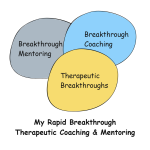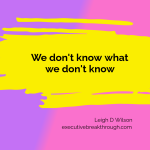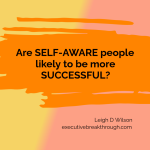Leigh D Wilson
Hi, I want to talk a little bit more about how our thinking can affect our experiences. This is part three of a series of short videos on the topic.
Whatever happens to us, our brains tend to color the experience with a feeling or emotion: that might be a good feeling, or it might be a neutral feeling, or it might be an unpleasant feeling. The reason this happens is so that we learn to approach things that make us feel good, to move on from things that don’t leave any sense or feeling at all, and to avoid things that are painful, just like we hurt our hand if we put it too close to the stove, so we learn not to put close to the stove again.
So, the pain has created a learning experience for us, unfortunately for us in one way but fortunately in another. Our survival has required that we have this negative bias in our recollection and our memory so that we learn to avoid these unpleasant experiences. This negativity bias tends to overlook good news and to highlight bad news, which will create anxiety and pessimism quite often.
As Dr Rick Hansen says that while the memories of happy or good events tend to stick as if they’re stuck with Teflon, the memories of bad experiences seem to be stuck with Velcro and we also tend to compound our suffering by the way we react and the way we think about unpleasant experiences.
Sometimes it can be that the secondary effect of this negative reviewing of painful experiences can actually be worse than the original experience itself. In fact, it can be that the original experience eventually gets forgotten but we’re left with the negative repercussions of the way we’ve viewed it. So, what can we do to avoid having a lifetime of angst of negative memories that we’re building up as we live our lives so that we can live happily and avoid negative things such as anxiety, depression, overwhelm and all these other negative emotional effects of a lot of negative memories?
My name is Leigh D Wilson and I’m a Master Executive Mindset Coach and I help busy professionals quickly let go of their inner struggles so that they can experience greater success and enjoyment of life.
To start with I want to thank all those who have made all the very nice caring comments on my earlier videos. I was just being discharged from hospital after having a bit of a repair job done after quite a serious incident with a dog that took a chunk out of the back of my hand, but that that’s all going really well, so I appreciate the kind thoughts that that have been expressed.
Now I’ve already spoken in the past in the earlier videos in this series about how we can create a lot of pain by resisting things that can’t be changed. There are a lot of things that we might not like about our circumstances that can’t be changed, either ever, or frequently, in the short term, and it’s a matter of learning how to accept these things and not resist them because it’s the resistance that can compound the pain.
Ways we can do this include practicing mindfulness, which I’ll be talking more about that in in future videos and this can be enhanced by mindfulness meditation, which I know sounds all very woo-woo but, believe me, it’s not: it’s just a way of learning to steel your mind and focus on the now, which is one of the principles of mindfulness. That can help a lot in terms of dealing with these negative experiences. We can also practice EFT, or the Emotional Freedom Technique, which is meridian tapping and I’ve written a short book about that called Feeling Good when things Go Bad, which you can find on Amazon or on my website and so I’ll talk more about that in the future.
There are numerous other methods that can be used and I’ll be talking about quite a few of these over time but I should mention that I also help people on a one-on-one basis with individual coaching and, if you’re interested in that at all, you can click on a link on one of my web pages, or one of the pages associated with this video, where you can organize a free Strategy Call where we can talk about your inner struggles and see what can be done about them.
So on a previous video I also talked about the power of reframing negative events and how, by looking at them in a different way, from a different perspective, we can take away the negative power and we find ourselves developing the habit of looking for the positive out of negative events, out of things that are unpleasant. Over time, this starts to become a way of being, a way of thinking, a way of approaching life, which is a much more fulfilling and empowering way of viewing all the things that that happened to you.
So that I’ve talked about that in an earlier video, and I’ve also mentioned the importance of having compassion for yourself. We’re often tougher on ourselves than we would be on any other person. I’ve suggested that it can be a good idea to look on your unconscious mind as being a young child, maybe a seven- to nine-year old child located within you and that child’s solely there to protect you and to look after your well-being and best interests.
If you imagine talking to a seven- to nine-year-old child in an aggressive, unkind way, an unhelpful way, that would be not very good for it. The child would probably want to run away and so talking this way to it would not achieve the goals that you might have set for yourself.
So, it’s far better to talk in a positive encouraging and helpful way to yourself just as you would to a nine-year-old child, or to anyone else for that matter, to try and empower them and help them rather than pull them pull them down.
Another way of ensuring that you’re not carrying around a lifetime of negative and painful memories is to make a point of enjoying positive experiences. It’s so easy on these busy days that we live, particularly with the internet and social media, etc. to quickly gloss over things, to forget to enjoy the smell of a beautiful flower or the sight of a sunset or looking at a bird flying in the sky, to not really relish the experience of living.
I couldn’t emphasize that enough, to learn to relish the experience of living by doing this and by recalling these positive experiences, no matter how small they are. It might simply be enjoying the lovely taste of a piece of toast or an ice cream and really making a point of enjoying the positive experiences. If we do this, these positive recollections and experiences will start to outnumber the long list of negative experiences that we accumulate as we as we grow older so that we’ve got a lot more pleasant memories to look back on. As a result, we will be empowered and uplifted and not pulled down in the same way that we would be if we simply limit ourselves to these negative emotions and experiences.
Along with that, and which is probably much the same thing, is living in the now enjoying, each moment as it as it progresses. That’s all we’ve got! In fact, there’s a little saying that ‘the past is history, the future is a mystery, the present is a present, which is why it’s called the present’.
So that really that’s what we’ve got: we really don’t know what’s going to happen in the future. I certainly didn’t envisage I was going to get bitten by a dog a few days ago. We don’t know what’s going to happen and so the best thing is to enjoy the moment that we have: that’s all we really have. The mindfulness work that I’ll talk about at other times will help you with that
Another way of dealing with these unpleasant experiences is to relive them and explore them with an inner attitude of curiosity because, if we’re feeling curious, this will overwhelm any negative emotions.
Imagine you’re a David Attenborough studying yourself as a human specimen reacting to some unpleasant event. Imagine what David Attenborough would be saying as he watched and analyzed this human being dealing with the event. And then, as you’re doing that, say to yourself “what is the lesson that accompanies this event? Why have I experienced this?”
For example, after putting your hand near a hot stove and you’re feeling a bit burnt, you might say, “well, what’s the lesson? It’s to not put my hand near a hot stove.”
Then, if you can then take a lesson away, you disempower the negative energy of it. You’ve learnt the lesson and then you can let go of the emotion, the emotion is no longer required, that was only there so that you could learn the lesson.
Another way of dealing with negative emotions or negative experiences is to experience gratitude. Gratitude I find is the most powerful human emotion. You might think love is and love can be an extraordinarily powerful emotion, but it can also have all sorts of complicated connections with it: love that’s not returned; the pain associated with love that occurs sometimes; and the opposite of love is hate and, because things tend to exist in in polar opposites, if you’re thinking about love a little bit of you are thinking about hate, whereas the polar opposite to gratitude is not a very powerful emotion so by feeling gratitude, by being grateful, we are in an empowered state.
I’ve actually done quite a bit of experimenting with biofeedback where you wire up to computers and various things and assess the impact of thinking and feeling in different ways and observe what that does actually to your brain waves and to your overall central nervous system.
Doing these experiments, I find that feeling gratitude such as imagining breathing gratitude out through your heart with every out breath, imagining a grateful out-breath that you’re filling the universe with gratitude. The gratitude can even be for the simplest things, such as, even if you’re stuck in a hospital, just being grateful that you’ve got a nice bed to lie in or that you’ve got nice air to breathe.
There’s always something that you can be grateful for and by focusing on this and breathing that out through your heart you will undo any negative emotions that you might be suffering from.
So, there’s a few valuable tips. They might seem simple, and, in fact, they actually are so it’s really a matter of just remembering to practice them.
Anyway, I hope you enjoy these videos. If you are, if you do enjoy them, please make a point of subscribing and looking for various other links that are on my site so that you can learn more about the work that I do.
Thank you.
Edited transcript







